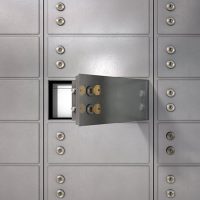Include Safety Deposit Boxes In Your Estate Plan

Although we do live in a digital age, and it seems like everything we own is online, there are still physical objects and possessions, and those objects are sometimes stored in safe deposit boxes in banks and other similar institutions. The items in these boxes may have significant value, or they may only have sentimental value to you or your family. Either way, it’s helpful to know how to access them after the owner passes away.
Accessing Safe Deposit Boxes
Like most things with banks, our safe deposit boxes are very much protected. You cannot just walk into a bank, tell them the owner has passed away, and expect to get access to the box. In fact, it is so hard to get access to these boxes, that many times, the items in the boxes end up in the state unclaimed property database, or they are lost forever.
Tell People You Have One
The first thing to do if you have a safety deposit box is to let people know that it even exists. You can, of course, do this by including it in a will or other estate document, but don’t leave it out, otherwise nobody will ever even know to look for and retrieve the contents of the box.
Accessing the Box
For someone else to access your safe deposit box, they will need proof of the owner’s passing, identification and they must have a key. That means that you may want to provide a spare key to someone that you trust—preferably whomever you will be leaving the contents of the box to.
You can get other ways to prove passing, like coroner records or hospital records—but there is no replacement for the key.
Someone without a key can still access the contents of the box, but it will be more difficult; they will be left to ask the probate court for permission to access the box, a process that could take some time.
Adding Other Owners
When you have the box, you do have the option of adding a joint holder or another owner. That can be helpful, and avoid all the headaches of accessing the box. But be aware that the joint holder has every right to open, access—and yes, steal—whatever is in your box at any time. So if you go that route, make sure it’s someone that you trust.
Even if you have a joint owner, you still need to include the safety deposit box in your estate documents, in the event that the joint owner passes away before you do ,which would again leave the contents of your box up to the probate court.
Trusts
Remember that the contents of your box can be transferred to a trust, while you are still alive. That can avoid probate, and make it easier for whomever you designate, to access the contents of the box.
We can help you plan for the contents of your safe deposit box–and all your other assets and property. Call the Torrance will and estate attorneys at Samuel Ford Law today.
Sources:
guide.peacefully.com/statespecific-tasks/how-to-access-the-safe-deposit-box-after-the-death-of-a-loved-one-california
weareatticus.com/ultimate-guide/safe-deposit-boxes-regulations
